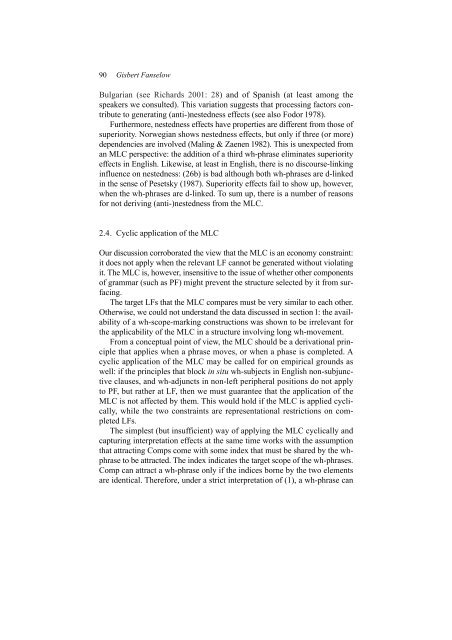Minimality Effects in Syntax · The MLC and Derivational Economy ...
Minimality Effects in Syntax · The MLC and Derivational Economy ...
Minimality Effects in Syntax · The MLC and Derivational Economy ...
You also want an ePaper? Increase the reach of your titles
YUMPU automatically turns print PDFs into web optimized ePapers that Google loves.
90 Gisbert Fanselow<br />
Bulgarian (see Richards 2001: 28) <strong>and</strong> of Spanish (at least among the<br />
speakers we consulted). This variation suggests that process<strong>in</strong>g factors contribute<br />
to generat<strong>in</strong>g (anti-)nestedness effects (see also Fodor 1978).<br />
Furthermore, nestedness effects have properties are different from those of<br />
superiority. Norwegian shows nestedness effects, but only if three (or more)<br />
dependencies are <strong>in</strong>volved (Mal<strong>in</strong>g & Zaenen 1982). This is unexpected from<br />
an <strong>MLC</strong> perspective: the addition of a third wh-phrase elim<strong>in</strong>ates superiority<br />
effects <strong>in</strong> English. Likewise, at least <strong>in</strong> English, there is no discourse-l<strong>in</strong>k<strong>in</strong>g<br />
<strong>in</strong>fluence on nestedness: (26b) is bad although both wh-phrases are d-l<strong>in</strong>ked<br />
<strong>in</strong> the sense of Pesetsky (1987). Superiority effects fail to show up, however,<br />
when the wh-phrases are d-l<strong>in</strong>ked. To sum up, there is a number of reasons<br />
for not deriv<strong>in</strong>g (anti-)nestedness from the <strong>MLC</strong>.<br />
2.4. Cyclic application of the <strong>MLC</strong><br />
Our discussion corroborated the view that the <strong>MLC</strong> is an economy constra<strong>in</strong>t:<br />
it does not apply when the relevant LF cannot be generated without violat<strong>in</strong>g<br />
it. <strong>The</strong> <strong>MLC</strong> is, however, <strong>in</strong>sensitive to the issue of whether other components<br />
of grammar (such as PF) might prevent the structure selected by it from surfac<strong>in</strong>g.<br />
<strong>The</strong> target LFs that the <strong>MLC</strong> compares must be very similar to each other.<br />
Otherwise, we could not underst<strong>and</strong> the data discussed <strong>in</strong> section 1: the availability<br />
of a wh-scope-mark<strong>in</strong>g constructions was shown to be irrelevant for<br />
the applicability of the <strong>MLC</strong> <strong>in</strong> a structure <strong>in</strong>volv<strong>in</strong>g long wh-movement.<br />
From a conceptual po<strong>in</strong>t of view, the <strong>MLC</strong> should be a derivational pr<strong>in</strong>ciple<br />
that applies when a phrase moves, or when a phase is completed. A<br />
cyclic application of the <strong>MLC</strong> may be called for on empirical grounds as<br />
well: if the pr<strong>in</strong>ciples that block <strong>in</strong> situ wh-subjects <strong>in</strong> English non-subjunctive<br />
clauses, <strong>and</strong> wh-adjuncts <strong>in</strong> non-left peripheral positions do not apply<br />
to PF, but rather at LF, then we must guarantee that the application of the<br />
<strong>MLC</strong> is not affected by them. This would hold if the <strong>MLC</strong> is applied cyclically,<br />
while the two constra<strong>in</strong>ts are representational restrictions on completed<br />
LFs.<br />
<strong>The</strong> simplest (but <strong>in</strong>sufficient) way of apply<strong>in</strong>g the <strong>MLC</strong> cyclically <strong>and</strong><br />
captur<strong>in</strong>g <strong>in</strong>terpretation effects at the same time works with the assumption<br />
that attract<strong>in</strong>g Comps come with some <strong>in</strong>dex that must be shared by the whphrase<br />
to be attracted. <strong>The</strong> <strong>in</strong>dex <strong>in</strong>dicates the target scope of the wh-phrases.<br />
Comp can attract a wh-phrase only if the <strong>in</strong>dices borne by the two elements<br />
are identical. <strong>The</strong>refore, under a strict <strong>in</strong>terpretation of (1), a wh-phrase can
















